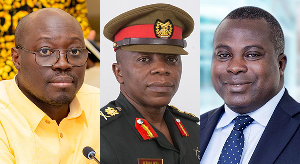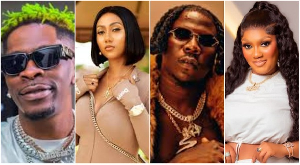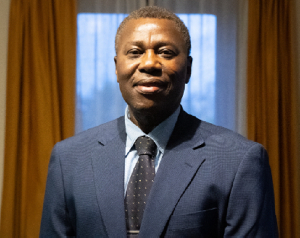By Kwame Okoampa-Ahoofe, Jr., Ph.D.
Garden City, New York
August 12, 2015
E-mail: okoampaahoofe@optimum.net
Davidson casts the beginnings of the life of his protagonist and Ghana’s future premier as a formidable figure on the continental African political landscape as follows: “Nkrumah was born to the senior wife of a goldsmith of the Nzima language-group who live in the south-western corner of Ghana: probably, he himself thought, on a Saturday in mid-September of the year 1909.¶ His mother used to say that the true date was 1912, but a Roman Catholic priest who baptized the young Nkrumah wrote 1909 in his records, and that seems to be the right date. He was a village boy close to the customs of his people, the child of a large and an easygoing family. This family was part of a people who have lived since time immemorial in the [the] sound of the sea, who knew in their time the first small ships from Europe, and who have played a vivid role in the commercial life of their coastland: an outgoing, self-confident, hardworking sort of people, accustomed more than most peoples to the chances and changes of life” (Black Star 19).
Was Nkrumah a “homogynist” (misanthrope?) or misogynist or simply Afro-misogynist? The picture is not clear to the author of the Black Star, who claims to have had a quite intimate relationship with the Ghanaian leader. But it also needs to be pointed out that Nkrumah’s relationship with women has been quite considerably subjected to scholarly discussions. For Davidson, whatever the nature of the demons shaping his attitude towards women in general, Nkrumah was quite a complex character when it came to his relationship with the proverbial members of the Second-Sex or the female species of humanity. On the foregoing score, this is what his biographer has to say: “His mother meant much to him. A strong-minded woman, she made sure that he went to school, and remained a central figure to him throughout his life. It was characteristic of the grown man that she should be the first person whom he sought when returning from his years abroad. Perhaps it was also for this reason, this importance to him of his mother, that he never found it easy to make a close and lasting relationship with any other woman. He used to say that women frightened him, explaining in 1957, when he was nearly fifty, that ‘it is not fear today, but something deeper. Perhaps it is a dread of being trapped, of being in some way overpowered.’¶ There would be several women in his life to whom he gave his confidence. But the evidence suggests that he preferred to keep the relationship informal, although his one marriage, embarked on late in life, seems to have brought him happiness as well as a good wife and children. He had a large need for love and affection, and was capable of showing both. But it is also true that he showed these feelings with reserve, and this reserve was to be an obstacle to the confidence that others might wish to give him in return” (Black Star 20).
For Davidson, the apparently intractable dilemma of the African intellectual today, or in the postcolonial era, is a seemingly ingrained, albeit largely subconscious, culture of inferiority, a veritable contradiction in which, on the one hand the African elite desperately seeks to extricate himself from Europe’s imperialist culture, while at the same time envisaging Europe as the font and/or apex of civilization and enlightenment to be sedulously and systematically emulated, if a progressive and comfortable and worthwhile existence is to be realized: ¶ “The contradiction stayed with the educated group, the elite, in all the years that followed. The men of the elite sincerely wished to ‘make the nation,’ but they thought that only people who were able and willing to take their examples from Europe would be able to do that. Europe had become their ‘spiritual home,’ So it was to be, in due course, that one of the soldiers who overthrew Nkrumah’s rule in 1966, Colonel (then Major) Afrifa, could write of the British military academy of Sandhurst with a boundless admiration, not only as a training school but also as a guide to political behavior. An Englishman might reply that whatever Afrifa may have learned at Sandhurst, he had not learned its sovereign rule about politics: that serving soldiers stay rigorously out of them [sic]” (Black Star 27).
For Davidson, as it also was for C. L. R. James before him, Nkrumah was not a naturally brilliant man; but he was a forceful personality on whom the imprint of remarkable leadership skills were unmistakable. In this, the future prime minister, and subsequently president, of Ghana could be aptly envisaged to be poignantly possessed of a contradictory personality, as opposed to a conflicting personality. For although he was deemed to be barely articulate, nevertheless, Nkrumah was a spellbinding orator of prepared speeches, but never a man of the sonorous art of repartee or spur-of-moment nimbleness: “He was never a great public speaker, but in the more intimate atmosphere of a debate he came really into his own. Here his rather weak voice was no disadvantage; while his bookishness and incessant reading helped to make him impressive. To marshal and carry an argument he still needed much preparation, and this indeed he would always need: his gift was not for off-the-cuff brilliance in discussion. ‘He had charm, a sort of delightful gaucherie, explosive mirth, and so on,’ Professor Jones-Quartey has recalled of those student days in America. ‘But he was plain inarticulate in serious unrehearsed discussion.’ Yet his personality seemed already to have marked him out as a man who would lead” (Black Star 32).
Once again, Davidson provides us with his most poignant hint that Kwame Nkrumah may well have been gay. At the very least, Nkrumah clearly appears to have been a pathological misogynist, if there were any such sexual orientation. Perhaps it was the cultural norms and societal expectations of the time that caused him to enter into extremely short-lived bonds with women, including his very young Egyptian wife: “Yet a professional life meant settling down [this was after Nkrumah had earned a master’s degree in education from Philadelphia’s University of Pennsylvania]; and settling down, among other things, meant marriage. Any thought of marriage conjured up his anxiety about women. He formed several friendships with women in the United States and some of them appear to have been intimate; but he made sure they never lasted. In his attitudes to women he swayed between fear and arrogance. It was an unhappy side of his character, and he never overcame its emotional immaturity” (Black Star 34-5).
The story of Nkrumah’s having been hired by a Philadelphia Presbyterian Church to conduct a survey of how Black Americans lived, may very well have been a suavely concocted apocryphal version of the Ford Foundation – or some such foundation – sponsored W.E.B. DuBois ethnographical surveys the earliest of which was published as The Philadelphia Negro in 1899, or thereabouts, a full-decade or so before the birth of Ghana’s future leader and a protégé of Dr. DuBois’. The true story might have been that about the time that he was studying for his graduate degree at the University of Pennsylvania, in the early 1940s, DuBois must have received a grant or fellowship to study African-American life, perhaps a review of his first study nearly a half-century later. Dr. DuBois may well have hired his young continental African friend to assist with the collection of data in the form of interviews conducted with some heads of Black families. He most likely would have gained a lot of insight into the proverbial African-American Experience. At any rate, this is the apocryphal version narrated to Davidson by his biographical subject:
“In Philadelphia, at one point, he was employed by the Presbyterian Church to carry out a survey of how local black people lived, and what they believed, and how much money they had. He went into hundreds of black homes, and learned the black American story from the inside. He was beginning to understand the white American story as well, but not as told in the tourist literature or in patriotic history books. He saw the massive unemployment of whites as well as blacks, the dreadful housing conditions in which many whites had to live, the country’s poverty as well as its pride. Back at home the schools had taught about the white man’s world as though it were a paradise where everyone was rich and happy. The truth, he found, was different” (Black Star 38).
Opinions of Friday, 11 September 2015
Columnist: Okoampa-Ahoofe, Kwame














